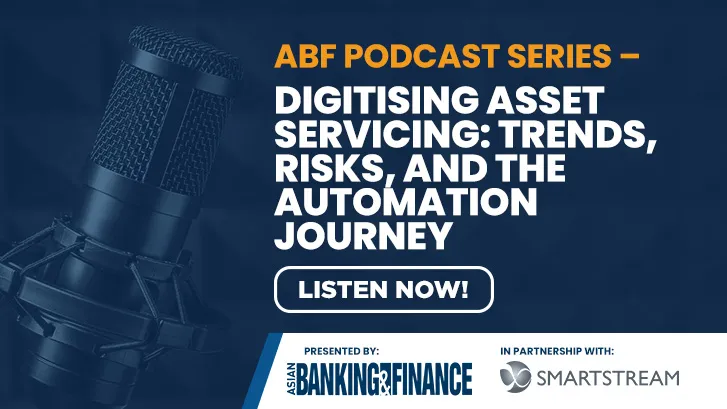
Delays in the Digitalisation of Asset Servicing Operations Lead to Financial, Reputation Losses
A range of industries has embarked on their digital transformation. In banking and finance, while payments and many customer-facing departments now offer digital banking services, many departments – such as asset servicing – continue to perform manual processes painstakingly.
Asset servicing is an activity known as service corporate action events performed by custodians for their corporate clients, such as fund services, custody and accounting, outsourcing services, securities lending, payment of dividends, stock splits, tender offers, and mergers and acquisitions.
These events link investors to the issuer to share information, raise capital, manage debt, and facilitate structural changes. Whilst some events are simple, others are not. The number of participants in the information chain adds to the complexity.
In this episode of the Asian Banking and Finance (ABF) podcast series, contributing editor Simon Hyett sits down with SmartStream’s Adam Cottingham, Global Head of Asset Servicing in London to discuss how organisations can embark on their corporate actions automation journey.
Asset Servicing Trends
Having worked with SmartStream for 10 years, Cottingham observed that the asset servicing market continues to be driven by traditional processes. Multiple counterparties often communicate with each other across a complex process or use proprietary formats and manual workarounds, often resulting in mismatched information.
To create an image, he cites an event process that starts from an issuer, then onto an exchange, central securities depositories (CSD), custodian network, bank, and finally an asset manager – a workflow that is erroneous and presents a struggle amongst banking and finance professionals.
“They can look at projects to improve it, but you can't get away from the fact that people do miss events and process events, and this costs money,” Cottingham said. This is where digitised asset servicing can help manage and optimise frequently changing event details, multiple intermediaries, and upcoming deadline calls.
Delaying the Journey
Organisations, however, are hesitant to embark on asset servicing automation, as they scrutinise its possible impact on the process, event-related data management, timelines and deadlines, and elections for voluntary events, amongst others.
“What this operational risk translates into is critical event risk, where there is a potential for loss or missed elections or missed process events. Something else we're also seeing on the risk side is an awareness of settlement risk as T plus one comes into place,” Cottingham said.
Citing the American experience, this means an asset servicing organisation must have a real-time processing capability to be transparent and mitigate against potential veiled settlements.
Cushioning the Risks
To mitigate the risks, a number of industry bodies have initiated benchmarks, beginning with the S&PG and MPG best practices in accordance with Swift. European banks have launched initiatives around the score, which provides 15 directions on processing corporate actions, including incremental election deposits. Meanwhile, the Shareholder Rights Directive (SRD II) aims to strengthen shareholders’ position and reduce excessive short terms and risk-taking within companies traded on European Union-regulated markets.
“People are becoming more aware of the risks, creating a common understanding. But we're seeing very prominently that the market is sticking with manual processes, and it’s not going to resolve these risks,” Cottingham said, adding that money and reputation will continue to be lost with missing and misprocessing events.
As emerging technologies become available in the market, catalysed by the COVID-19 pandemic, industry and organisational leadership are becoming enamoured by the possibilities of automation and real-time processing. But they must deal with another challenge: finding the knowledge and skills to start the transformation.
“That's also critical to making sure that we're able to take on these projects and create the successful transformation towards automation,” said Cottingham.






![Lorem Ipsum [ABF 1]](https://cmg-qa.s3.ap-southeast-1.amazonaws.com/s3fs-public/styles/exclusive_featured_article/public/2025-03/a_hand_pointing_to_a_futuristic_technology_5b87c9d0e3_1.png.webp?itok=2w0y1WhS)


![Cross Domain [Manu + SBR + ABF + ABR + FMCG + HBR + ]](https://cmg-qa.s3.ap-southeast-1.amazonaws.com/s3fs-public/styles/exclusive_featured_article/public/2025-01/earth-3537401_1920_4.jpg.webp?itok=WaRpTJwE)








 Advertise
Advertise

